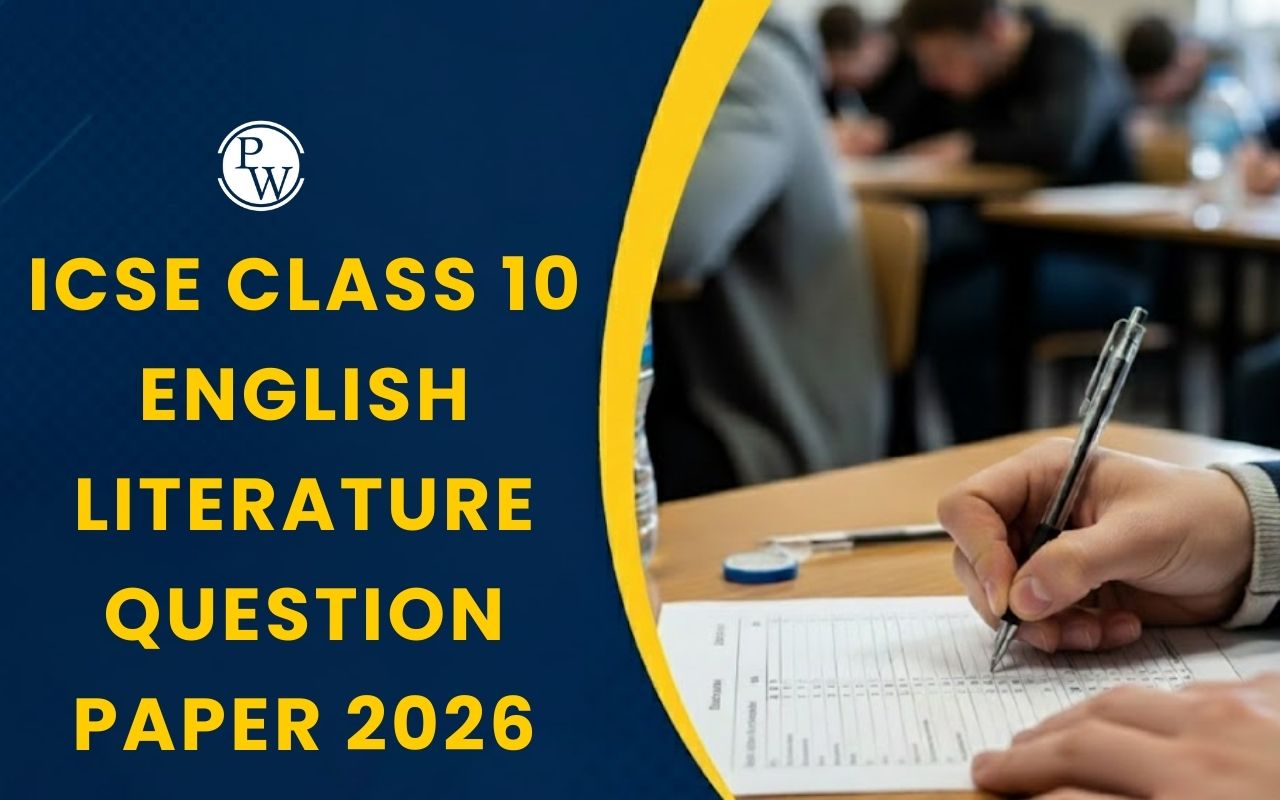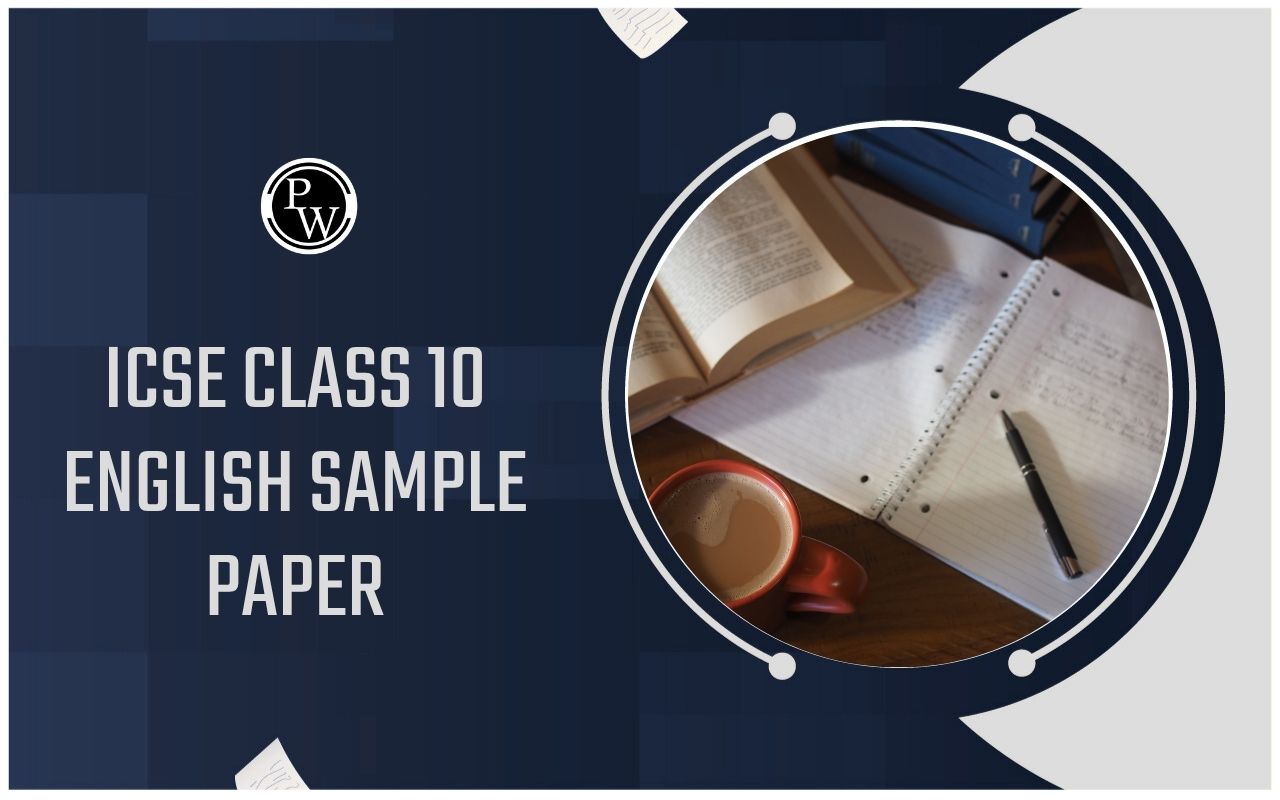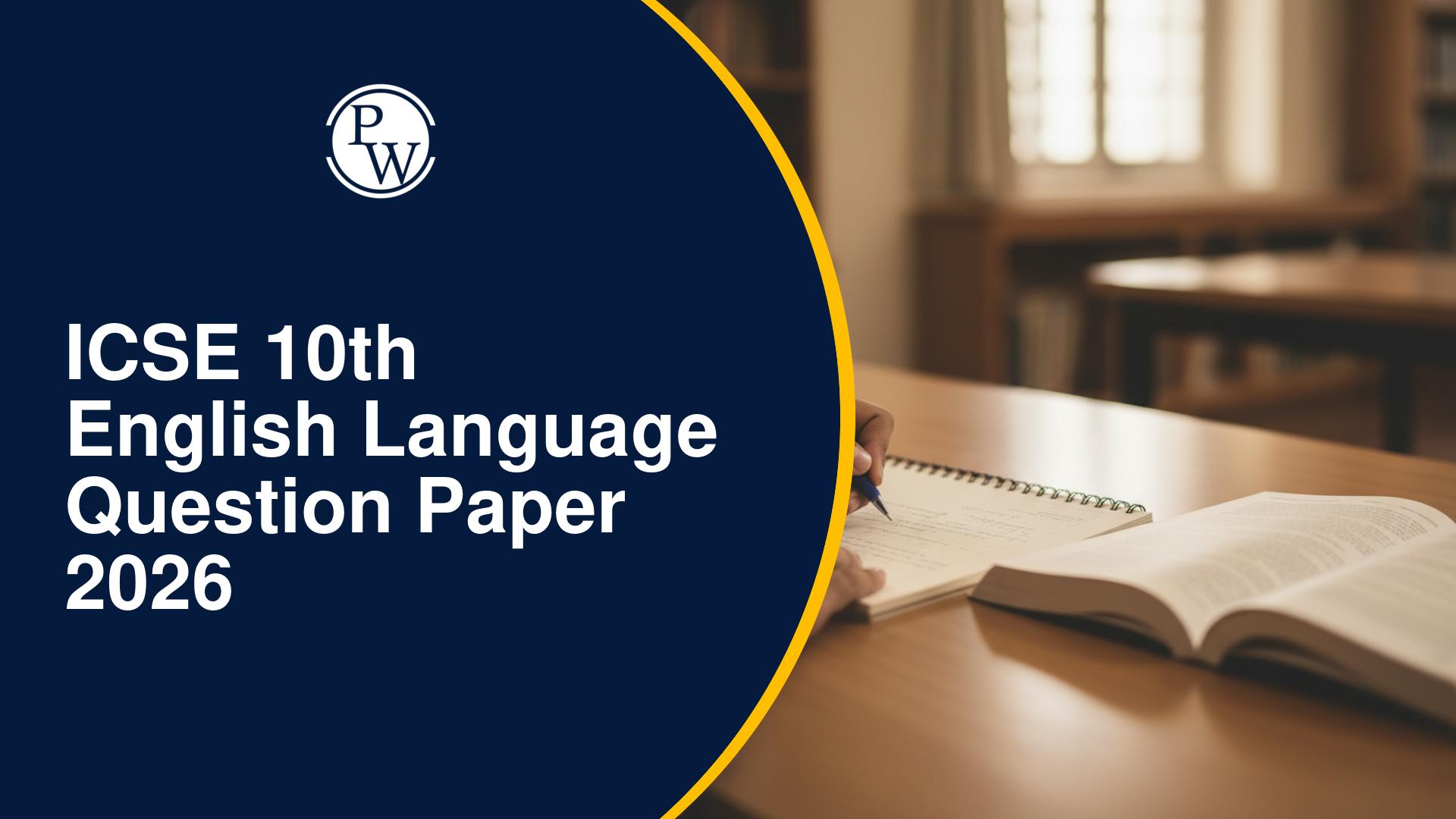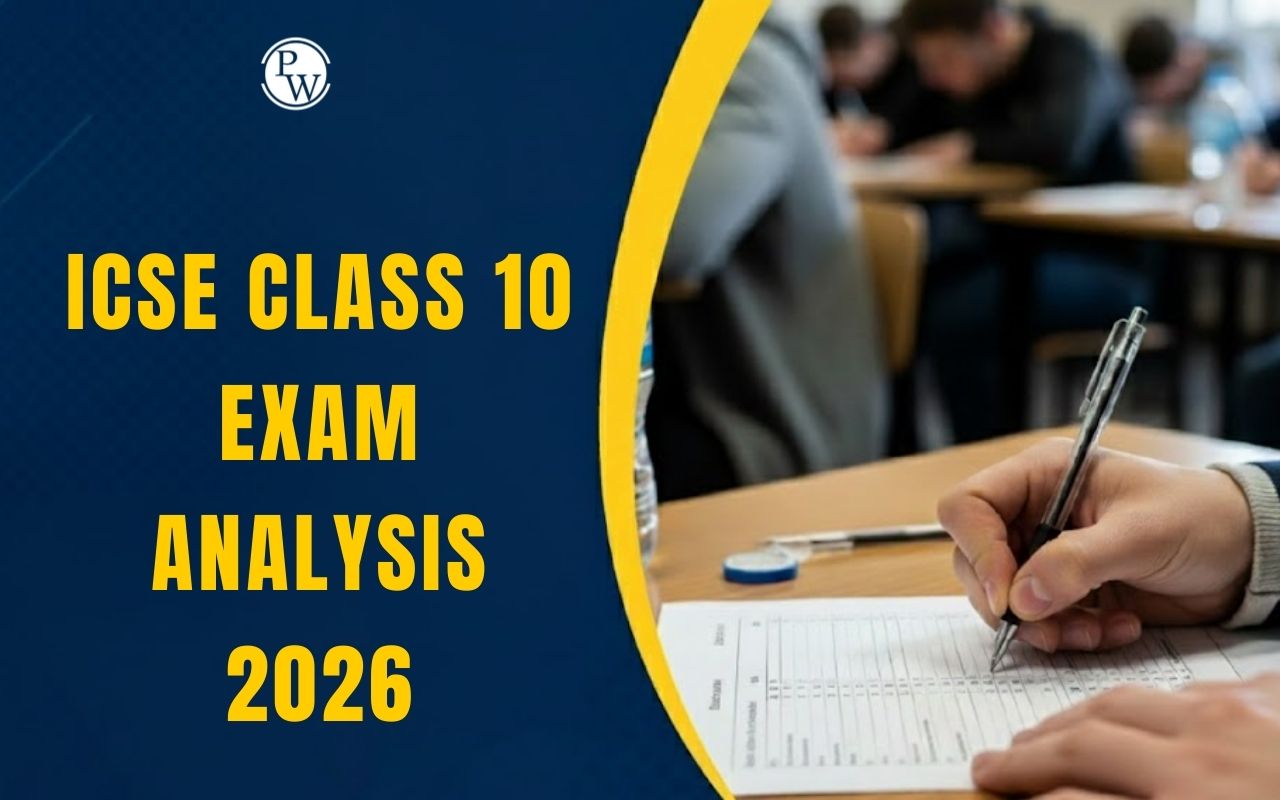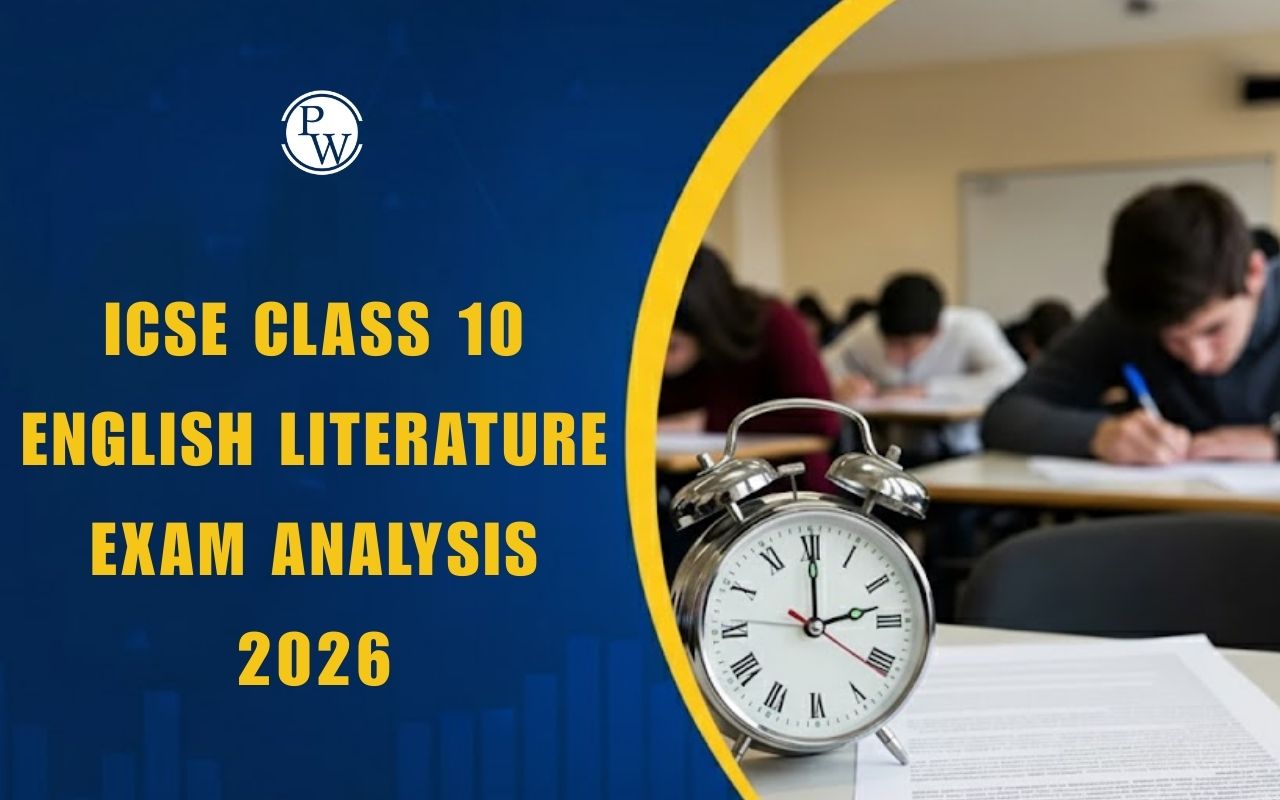If you're preparing for the ICSE Class 10 Chemistry Board Exam 2025-26, it's important to understand the exam pattern thoroughly. This will help you manage your time and approach each section strategically.

The ICSE Class 10 Chemistry syllabus for the academic year 2025-26 has been officially released by the Council for the Indian School Certificate Examinations (CISCE). This syllabus provides a comprehensive outline of all essential topics and concepts that students are expected to master during the academic session.
Key areas include Periodic Properties, Chemical Bonding, Acids, Bases and Salts, Analytical Chemistry, Mole Concept and Stoichiometry, Electrolysis, Metallurgy, and Organic Chemistry. The syllabus also emphasizes practical experiments to strengthen understanding through hands-on learning and observations.
With the ICSE Class 10 Chemistry Board Exam scheduled on 11th March 2026, reviewing the syllabus now is crucial. By following it carefully, students can structure their preparation, focus on important topics, revise efficiently, and approach the board exam with clarity and confidence.
ICSE Class 10 Chemistry Solutions
ICSE Class 10 Chemistry Syllabus 2025-26 Overview
The Council for the Indian School Certificate Examinations (CISCE) has released the ICSE Class 10 Chemistry syllabus for the academic year 2025-26. Below is an overview of the key details related to the syllabus and exam pattern.
| ICSE Class 10 Chemistry Syllabus 2023-2024 Overview | ||
| S.No. | Chapter | Topics |
| 1. | Periodic Properties and Variations of Properties | Periodic properties and variations in groups and periods |
| Periodicity on the basis of atomic number for elements | ||
| 2. | Chemical Bonding | Electrovalent, covalent and coordinate bonding |
| Structures of various compounds | ||
| Electron dot structure, characteristic properties | ||
| 3. | Study of Acids, Bases, and Salts | Simple definitions in terms of molecules and their characteristic properties |
| Ions present in mineral acids, alkalis, and salts and their solutions | ||
| Use of litmus and pH paper to test for acidity and alkalinity | ||
| Definition and types of salts | ||
| Action of dilute acids on salts | ||
| Methods of preparation of Normal salts with relevant equations | ||
| 4. | Analytical Chemistry | Action of Ammonium Hydroxide and Sodium Hydroxide on solution of salts Action of alkalis (NaOH, KOH) on certain metals, their oxides, and hydroxides |
| 5. | Mole Concept and Stoichiometry | Gay Lussac’s Law of Combining Volumes, Avogadro’s Law |
| Refer to the atomicity of hydrogen, oxygen, nitrogen, and chlorine | ||
| Vapour Density and its relation to relative molecular mass | ||
| Mole and its relation to mass | ||
| Simple calculations based on chemical equations | ||
| 6. | Electrolysis | Electrolytes and non-electrolytes |
| Definition and explanation of electrolysis, electrolyte, electrode, anode, cathode, anion, cation, oxidation, and reduction. | ||
| An elementary study of the migration of ions, illustrated by the electrolysis of various substances | ||
| Applications of electrolysis | ||
| 7. | Metallurgy | Occurrence of metals in nature |
| Stages involved in the extraction of metals | ||
| Extraction of Aluminium | ||
| Alloys - composition and uses | ||
| 8. | Study of Compounds | Hydrogen Chloride - preparation, reactions, properties |
| Ammonia - preparation, reactions, uses | ||
| Nitric Acid - preparations, reactions | ||
| Sulphuric Acid - preparation and its behaviour as an acid, oxidising agent, dehydrating agent | ||
| 9. | Organic Chemistry | Introduction to Organic compounds |
| Structure and Isomerism | ||
| Homologous series with characteristics and examples | ||
| Simple nomenclature | ||
| Hydrocarbons - alkanes, alkenes, alkynes | ||
ICSE Class 10 Chemistry Syllabus 2025-26 Chapter-Wise
ICSE Class 10 Chemistry Syllabus for 2025-26 aims to cover essential Chemistry concepts such as periodic properties, chemical bonding, acids, bases, salts, analytical chemistry, mole concept, stoichiometry, electrolysis, metallurgy, and organic chemistry. The detailed topics for each chapter are provided below:Chapter 1: Periodic Properties and variations of Properties – Physical and Chemical
(i) Understanding the variations of properties at regular intervals in groups and periods. Examine and grasp the definitions and trends of the subsequent periodic properties in both groups and periods:- Size of atoms
- Metallic attributes
- Non-metallic attributes
- Ionisation potential
- Electron affinity
- Electronegativity
Chapter 2: Chemical Bonding
(a) Electrovalent bonding: Electron dot structures for electrovalent compounds like NaCl, MgCl2, and CaO. Distinctive features of electrovalent compounds, such as their form of existence, melting and boiling points, conductivity (heat and electricity), and dissociation in solution and molten state connected to electrolysis.(c) Coordinate Bonding: Definition Explaining the lone pair effect of the oxygen atom in water and the nitrogen atom in ammonia, illustrating the formation of H3O+ and OH- ions in water and NH4+ ions.
Chapter 3: Study of Acids, Bases and Salts
(i) Clear explanations based on the molecules and their characteristic properties.- Direct combination
- Displacement
- Precipitation (double decomposition)
- Neutralisation of insoluble base
- Neutralisation of an alkali (titration)
- Action of dilute acids on carbonates and bicarbonates.
Chapter 4: Analytical Chemistry
(i) The effect of Ammonium Hydroxide and Sodium Hydroxide on salt solutions: observing the colour of the salt and its solution; noting the creation and colour of the precipitated hydroxide for Ca, Fe, Cu, Zn, and Pb salts; emphasising the unique impact of ammonium hydroxide on copper salt solutions, as well as the action of sodium hydroxide and ammonium salts.- Noting the colour of the salt and its solution.
- Adding Sodium Hydroxide gradually to solutions of Ca, Fe, Cu, Zn, and Pb salts, and observing the formation and colour of the resulting hydroxide precipitate, with relevant equations.
- Adding Ammonium Hydroxide gradually to solutions of Ca, Fe, Cu, Zn, and Pb salts, and observing the formation and colour of the resulting hydroxide precipitate, with relevant equations.
- Highlighting the specific impact of Ammonium Hydroxide on copper salt solutions and the effects of sodium hydroxide and ammonium salts.
Chapter 5: Mole Concept and Stoichiometry
(i) Gay Lussac's Law of Combining Volumes; Avogadro's Law.- Concept of mole – a quantity like a dozen or a gross (Avogadro's number).
- Avogadro's Law - declaration and explanation.
- Gay Lussac's Law of Combining Volumes – Explanation and statement.
- Understanding molar volume - "the weight of 22.4 litres of any gas at S.T.P. is the same as its molar mass." (Formal proof won't be covered but may be explained for clarity).
- Basic computations based on molar volume and Gay Lussac's law.
The explanation can be provided using equations for the creation of HCl, NH3, and NO.
Molecular mass = 2*vapour density (formal proof not needed) Derivation of simple (empirical) and molecular formulas from:
- (a) the percentage composition of a compound.
- (b) the masses of combining elements.
Chapter 6: Electrolysis
(i) Electrolytes and non-electrolytes. Definitions and examples.- Substances with molecules exclusively, ions exclusively, or a combination of molecules and ions.
- Examples explain how their composition influences their behaviour as strong or weak electrolytes and non-electrolytes.
- Molten lead bromide
- Acidified water with platinum electrodes
- Aqueous copper (II) sulphate with copper electrodes; showcasing electron transfer at the electrodes.
Chapter 7: Metallurgy
(i) Occurrence of metals in nature:- Mineral and ore - Meaning only.
- Common ores of iron, aluminium, and zinc.
- Conversion of concentrated ore to its oxide- roasting and calcination (definition, examples with equations).
- Reduction of metallic oxides- some can be reduced by hydrogen, carbon and carbon monoxide (e.g. copper oxide, lead (II) oxide, iron (III) oxide and zinc oxide) and some cannot (e.g. Al2O3, MgO) - refer to activity series). Active metals by electrolysis e.g. sodium, potassium and calcium.
- Electro refining – reference only.
- Chemical method for purifying bauxite by using NaOH – Baeyer’s Process.
- Electrolytic extraction – Hall Heroult’s process: Structure of electrolytic cell - the various components as part of the electrolyte, electrodes, and electrode reactions. Description of the changes occurring, the purpose of the substances used, and the main reactions with their equations.
Chapter 8: Study of Compounds
- Hydrogen Chloride
- Ammonia
- Nitric Acid
- Sulphuric Acid
Chapter 9: Organic Chemistry
(i) Overview of Organic Substances.ICSE Class 10 Chemistry Syllabus Practical Work
Candidates will need to observe the impact of reagents or heat on given substances. The exercises will be straightforward, involving the recognition and identification of certain gases and ions. However, examiners may choose substances beyond those with listed ions.- Gases: Hydrogen, Oxygen, Carbon dioxide, Chlorine, Hydrogen chloride, Sulphur dioxide, Hydrogen sulphide, Ammonia, Water vapour, Nitrogen dioxide.
- Ions : Calcium, Copper, Iron, Lead, Zinc, Ammonium, Carbonate, Chloride, Nitrate, Sulphide, Sulphite, Sulphate.
- Observe the action of heat on substances like copper carbonate, zinc carbonate, zinc nitrate, copper nitrate, and lead nitrate. Record observations, identify products, and make deductions (equations not required).
- Make a solution of an unknown substance: add sodium hydroxide solution or ammonium hydroxide solution, observe, and deduce. Warming the mixture may be necessary. Choose substances containing Ca2+, Cu2+, Fe2+, Fe3+, Pb2+, Zn2+, NH4+.
- Provide a solution of dilute acid and alkali. Determine which is acidic and which is basic, providing two tests for each.
- Add concentrated hydrochloric acid to given substances, warm, observe, identify any product, and make deductions for copper oxide and manganese dioxide.
ICSE Class 10 Chemistry Exam Pattern 2025-26
|
ICSE Class 10 Chemistry Exam Pattern 2025-26 |
|
|
Component |
Details |
|
Total Duration |
2 Hours |
|
Total Marks |
100 Marks |
|
Theory Exam |
80 Marks |
|
Internal Assessment |
20 Marks (Based on Practical Work) |
|
Sections in Theory Exam |
Section I (40 Marks) and Section II (40 Marks) |
|
Section I |
Compulsory short-answer questions covering the entire syllabus |
|
Section II |
Six questions given, attempt any four out of the six |
ICSE Class 10 Chemistry Syllabus 2025
Study without using the internet
Preparation Tips for ICSE Class 10 Chemistry 2025
- Review the Syllabus Thoroughly: Go through the ICSE Class 10 Chemistry syllabus 2025-26 carefully. Focus on important chapters: Chemical Reactions, Acids, Bases and Salts, Periodic Table, Metallurgy, and Organic Chemistry. Identify chapters or topics that carry more weight in the board exam (based on previous years’ papers).
- Understand Concepts, Don’t Just Memorize: Learn why and how reactions occur. Relate reactions to real-life applications for better understanding. Avoid rote learning; focus on logical reasoning behind each concept.
- Practice Chemical Equations: Regularly practice balancing chemical equations. Ensure accuracy and proper representation of reactants and products. Pay attention to oxidation-reduction reactions and other commonly tested types.
- Make Notes and Use Flashcards: Create concise notes for definitions, formulas, reactions, and important tests. Use flashcards for quick revision of chemical formulas, valencies, and periodic table trends.
- Master the Periodic Table: Revise groups, periods, trends, and properties of elements. Focus on key elements frequently asked in exams.
- Practice Numericals: Solve problems from Mole Concept, Gas Laws, and Stoichiometry. Show all steps clearly and perform unit conversions carefully. Time yourself while solving numericals to improve speed and accuracy.
- Prepare for Practicals and Internal Assessment: Internal assessment carries 20 marks; perform all practicals diligently. Maintain a complete and accurate lab record book. Revise common viva questions and experiment observations.
- Solve Past Papers and Mock Tests: Practice previous years’ papers to understand the exam pattern. Attempt mock tests within the 2-hour time limit. Identify your weak areas and revise them thoroughly.
ICSE Class 10 Chemistry Syllabus FAQs
What are the main topics covered in the ICSE Class 10 Chemistry Syllabus 2026?
The syllabus covers fundamental concepts like periodic properties, chemical bonding, acids, bases, salts, analytical chemistry, the mole concept, stoichiometry, electrolysis, metallurgy, and organic chemistry.
Where can I find the official ICSE Class 10 Chemistry Syllabus 2026?
You can download the official syllabus PDF from the Council for the Indian School Certificate Examinations (CISCE) website @cisce.org.
What is the exam pattern for ICSE Class 10 Chemistry?
The exam consists of two parts: Part I (Theory) with short answer and long answer questions, and Part II (Practical) with experiments and viva voce.
How can I prepare for the ICSE Class 10 Chemistry practical exam?
Thoroughly understand the theoretical concepts behind the experiments listed in the syllabus, practice drawing diagrams and chemical equations, and be prepared to explain your observations and results to the examiner.
What are some tips for scoring well in ICSE Class 10 Chemistry?
Regularly attend classes and pay attention in lectures, practice solving past year question papers and sample papers, focus on understanding key concepts rather than rote learning, and maintain a good study schedule.
Talk to a counsellorHave doubts? Our support team will be happy to assist you!

Check out these Related Articles
Free Learning Resources
PW Books
Notes (Class 10-12)
PW Study Materials
Notes (Class 6-9)
Ncert Solutions
Govt Exams
Class 6th to 12th Online Courses
Govt Job Exams Courses
UPSC Coaching
Defence Exam Coaching
Gate Exam Coaching
Other Exams
Know about Physics Wallah
Physics Wallah is an Indian edtech platform that provides accessible & comprehensive learning experiences to students from Class 6th to postgraduate level. We also provide extensive NCERT solutions, sample paper, NEET, JEE Mains, BITSAT previous year papers & more such resources to students. Physics Wallah also caters to over 3.5 million registered students and over 78 lakh+ Youtube subscribers with 4.8 rating on its app.
We Stand Out because
We provide students with intensive courses with India’s qualified & experienced faculties & mentors. PW strives to make the learning experience comprehensive and accessible for students of all sections of society. We believe in empowering every single student who couldn't dream of a good career in engineering and medical field earlier.
Our Key Focus Areas
Physics Wallah's main focus is to make the learning experience as economical as possible for all students. With our affordable courses like Lakshya, Udaan and Arjuna and many others, we have been able to provide a platform for lakhs of aspirants. From providing Chemistry, Maths, Physics formula to giving e-books of eminent authors like RD Sharma, RS Aggarwal and Lakhmir Singh, PW focuses on every single student's need for preparation.
What Makes Us Different
Physics Wallah strives to develop a comprehensive pedagogical structure for students, where they get a state-of-the-art learning experience with study material and resources. Apart from catering students preparing for JEE Mains and NEET, PW also provides study material for each state board like Uttar Pradesh, Bihar, and others
Copyright © 2026 Physicswallah Limited All rights reserved.

